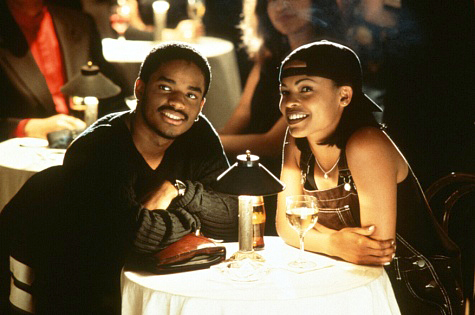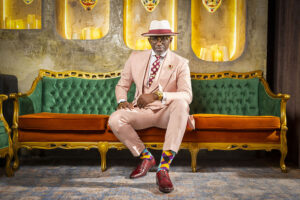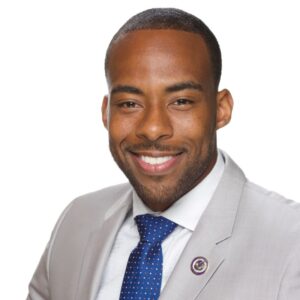Lines That Linger
Darius Lovehall: “I really dig you, Nina, and I hope we didn’t move too fast. … I’ma get myself an omelet. You want anything else?”
Nina Mosley: “Don’t ask me that.”
That seminal moment—equal parts playful and poignant—stirs hearts nearly three decades later. Spoken by Larenz Tate’s Darius to Nia Long’s Nina in “Love Jones,” it was more than flirtation. It was the beginning of a love story that felt like ours. And now, in 2025, the two stars of that poetic, culture-shifting romance return as ambassadors of the American Black Film Festival (ABFF), reigniting a flame that never truly faded.
A Festival with Purpose
This year’s ABFF, presented by NICE CROWD, will take place in Miami Beach from June 11–15, followed by an online encore on ABFF PLAY from June 16–23. But amid the buzz of new films and rising talent, one event stands apart: ABFF Remembers: Love Jones, a heartfelt tribute to the 1997 classic that changed the face of Black romance in cinema. Its influence didn’t end in theaters—it became a touchstone for art, intimacy, and identity.
A Reunion Beyond Nostalgia
Long and Tate—two of the most revered actors of their generation—will reunite for an intimate conversation, revisiting on-set memories, unpacking the film’s cultural impact, and sharing the quiet truths of a friendship that’s endured beyond the screen. This reconnection isn’t just nostalgia—it’s a celebration of legacy, chemistry, and the enduring necessity of Black storytelling.
A Moment That Sparked a Movement
“Their work in ‘Love Jones’ remains iconic, and they have long been trailblazers in the industry,” said Jeff and Nicole Friday, co-founders of NICE CROWD. “Their contributions to ABFF’s mission have been immeasurable, dating back to the festival’s early days in Acapulco in the late ’90s. We are honored to count them as dear friends.”
How Sundance Changed Everything
For Jeff Friday, “Love Jones” was a revelation long before this year’s tribute. In 1997, he attended the Sundance Film Festival—a space not known for its diversity—where “Love Jones”quietly stole the show, winning the coveted Audience Award. The win was seismic—not just for Black filmmakers, but for independent cinema.
“It proved to me that good stories are universal regardless of who the filmmakers and the actors are,” Friday reflected. “It reinforced what we genuinely believe about humanity—good movies cross over races.”
Love Jones: A Cultural Masterpiece
But “Love Jones” wasn’t just a good movie. It was a cultural masterpiece.
The film, written and directed by Theodore Witcher, walked the line between spoken word and cinema, jazz club and living room, sex and intimacy. It followed Darius and Nina—two artists navigating love, lust, and vulnerability in 1990s Chicago—with emotional nuance rarely afforded to Black characters at the time. They weren’t caricatures; they were complex, flawed, magnetic. Their love, like the poetry woven throughout the film, wasn’t always tidy—but it was always true.
The Ache of Timing
“A guy and girl can be just friends,” the Dave Matthews Band once sang, “but they will fall for each other at one point or another. Maybe temporarily, maybe at the wrong time, maybe too late, or maybe forever.” Witcher’s “Love Jones” understood that kind of timing—that kind of ache.
It gave us language for what we’d long felt but hadn’t seen reflected. We recognized our stories in the sacred tension between a look and a line—between Nina’s guarded independence and Darius’s quiet confidence. We saw the mess and the magic of modern Black love.
A Soundtrack That Still Sings
ABFF’s tribute to the film will be more than a panel—it’s an experience. Attendees can expect a curated musical journey through the “Love Jones” soundtrack, a soul-drenched mixtape of jazz, neo-soul, and R&B that captured the heartbeat of a generation. The notes of Dionne Farris’ “Hopeless” or Maxwell’s “Sumthin’ Sumthin’ (Mellosmoothe)” don’t just recall a moment—they evoke a mood, a memory, a movement.
Legacy, Lifted
The evening will serve as a kind of cinematic communion—a reminder that art can reflect and remind us who we’ve always been.
It’s fitting that this year’s festival centers on that reflection. ABFF’s core mission—to showcase Black content and uplift creatives of color—aligns seamlessly with the legacy of the cult classic. It proved audiences were hungry for depth and style, laying the foundation for a generation of storytellers who refused to flatten Black love into tropes or tragedy.
Cultural Anchors for a New Era
As ABFF turns to its next chapter, Nina and Darius are present as characters and cultural anchors. Their fictional romance may have been born of lines and performance, but what about the impact? That was all real.
To borrow from the Song of Solomon: “Many waters cannot quench love, neither can the floods drown it.” Not time. Not manias. Not even Hollywood’s white noise—or its selective, dismissive amnesia.
Black love isn’t a genre. It’s a force; it always sets the table for two.
And Guess Who’s Coming to Dinner?
Nia (Nina) and Larenz (Darius). They made Black people believe that poetry could look and sound like real life—and that real life could be poetry. Nina, who turned our most vulnerable snapshots—and Darius’s prose—into visible scripture, confirms that a look across a room, a thought scribbled in a composition notebook, or a Sunday morning meal, post-coital and vulnerable, can transmit more truth than any monologue. Their art gave language to our sentimental silences—and soul to the stories of Black folk.
To quote Darius’s A Blues for Nina:
“Is that alright?”






